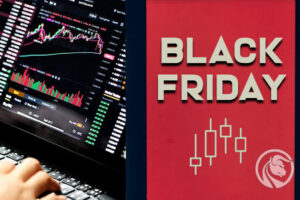What is the importance of the speed of execution of orders?
Order execution, and more precisely the speed of order execution, is one of the most important factors in the Forex market. It is especially important for those traders who specialize in day-trading, scalping and using automated strategies. Why is this so? There is no cover to say that on Forex market prices change almost all the time, and it often happens very dynamically. Imagine that we go to a supermarket with the crowd, which offers goods at very favorable prices. If we hurry up or we are at the beginning of this crowd, our chances of buying goods at a good price definitely increase.
It is the same in the currency market. First come first served. The price will change soon and the one who transfers his order to the 'cashier' faster will get a better price. Or maybe not so much more advantageous as closer to the current one. The following article will bring to your attention a few important facts on this topic.
What determines the speed of the execution?
There are several factors for this. Contrary to appearances, the most important of them is NOT the speed of our internet connection. I would say that this is one of the least important pieces of this puzzle. The speed of the link, i.e. how many Mb / s our internet provider offers us, is important when downloading large data packets from the network. When trading in the Forex market, where usually the data packages we send to the broker are small (orders regarding orders), time is much more important. More precisely, the path that data must travel from our computer to the broker's server.
This phenomenon is called transmission delay and is measured by the so-called pingach (in milliseconds). Lower ping means lower latency, i.e. faster travel of the data to the destination point, and this is what we should care about.
There are websites where you can check the route that the packets sent by us to the destination. An example is that Pingdom. By entering the IP address of a given site or server, we can check the transmission time (option selected Ping) or route (traceroute). The more elements that our package has to go through, the longer the transfer time. Unfortunately, as a rule, we have a fairly limited impact because we do not move the broker server ourselves, as we usually have access to only a few Internet service providers, and checking only each of them requires connection of the link (and usually signing a contract for a certain period of time) ).
If we are physically in Poland, a broker he is from the USA and he has his servers there, so this path will be even longer. Of course, if we play long-term, this factor will not be too important for us, but with scalping, it becomes extremely important at what price we enter and exit the market.
The market model also has an impact on the speed of execution
Brokers operate in various market models, which has a fundamental impact on the manner of execution of orders. We distinguish models: Market Maker (MM) STP and ECNand also in the case of LMAX it comes MTF (stock exchange model). Depending on the model, we can encounter various situations that arise precisely as a result of slow data transfer to the broker.
READ NECESSARY: Types of Forex brokers - ECN, STP, MM
In the event of a dynamic price change and sending our order to the broker, if it occurs with a sufficiently long delay, then at the broker MM we will get the so-called re-quoting, i.e. re-asking for the price. We can then agree to the new-current price and send the order again (a re-quotation may occur again if the price changes) or cancel the transaction.
In other models, the so-called price slippage (slippage), i.e. the execution of the order at a different price than the one we saw on the platform at the time of sending the instruction. In other words, before our order reached the broker, the price had already changed and the execution took place at the current rate when it reached the server. Of course, this is only one and just a less important reason why the slippage may result.
Of course, it is also possible to deliberately delay the execution of orders by the broker or pointless, resulting from poor infrastructure, however, we omit these issues in this article.
The differences can be big
STP, ECN and MTF models strive for the same technology but they are slightly different from each other, and this can affect the speed of execution on the broker's server side. Mainly it is about the number of points that our transaction has to pass through to be implemented. It is presented as follows:
- MTF - client computer - LMAX server approx. 15ms + brigde 2ms + mtf matching speed 3ms,
- ECN - client computer - ECN broker server 15ms + brigde 2ms + aggregation matching speed (average 15ms) + last look 200-400ms,
- STP - client computer - STP broker server x ms - ECN broker server 15ms + brigde 2ms + aggregation matching speed (15ms average) + last look 200-400ms.
As you can see, the "last look" element appears in the ECN and STP models, which may delay the entire process. Additionally, in the STP model, where the road is the longest, slips are more likely. Of course, we are talking about very small time values, so it may not be felt at all or we will only notice the difference when executing orders with very dynamic price changes.
READ ALSO: The 'Last Look' is a thing of the past
It should also be remembered that the term "client's computer" is understood as the entire path that the order must travel from the platform on our computer to the broker's server (the ping issue discussed earlier).
What ping is acceptable?
Hearing about ping for the first time, it would be nice to have a point of reference. Otherwise, we will not even know whether a given value is "a lot" or "little".
Based on my own experience, I can say that when trading with Polish and foreign brokers with servers in Cyprus and London, a decent ping is the result of the order 50 ms. The 30-40 ms values are a very good result. In the case of brokers with servers in the US, a standard ping can grow even to 90-150 ms, and this is already a lot and we will certainly experience such data transfer time during our execution. Therefore, if you have the impression that despite the proximity of your broker's servers (Europe) your orders are slow to implement, it is worth checking the ping. It may turn out that it is still above 100 ms due to the number of points through which data packets are sent.
How can you minimize ping?
Such a ping can be attempted to minimize. The simplest way to change a broker is usually instead of bothering with a slow execution. Alternatively, if we have such a possibility, we can try to play on another internet connection, even through a mobile operator, if in a given place we have a good coverage and 3G or LTE. It may turn out that we will go out better than using eg Neostrada.
You can also equip yourself with VPS, i.e. buy a server from a company that specializes in such solutions, preferably with a location close to our broker's server. However, VPS is not very convenient to use manually and it can rather slow down our trading from hand. Therefore, it is recommended primarily in the case of using automatic strategies, where the running EA constantly watches without the need to have a computer turned on, and in addition, data transfer is extremely low. By buying a VPS close to the broker's servers, you can even go down to 1-2 ms ping, which is a great result.






















![Forex Club – Tax 9 – Settle tax on a foreign broker [Download the Application] Forex Club - Tax 9](https://forexclub.pl/wp-content/uploads/2024/02/Forex-Club-Podatek-9-184x120.jpg?v=1709046278)
![Trading View platform – solutions tailored to the needs of traders [Review] trading view review](https://forexclub.pl/wp-content/uploads/2024/03/trading-view-recenzja-184x120.jpg?v=1709558918)
![How to connect your FP Markets account to the Trading View platform [Guide] fp markets trading view](https://forexclub.pl/wp-content/uploads/2024/02/fp-markets-trading-view-184x120.jpg?v=1708677291)
![How to invest in ChatGPT and AI? Stocks and ETFs [Guide] how to invest in chatgpt and artificial intelligence](https://forexclub.pl/wp-content/uploads/2023/02/jak-inwestowac-w-chatgpt-i-sztuczna-inteligencje-184x120.jpg?v=1676364263)




![Izabela Górecka – “Success on the market depends not only on knowledge, but also on emotional stability” [Interview] Izabela Górecka - interview](https://forexclub.pl/wp-content/uploads/2024/04/Izabela-Gorecka-wywiad-184x120.jpg?v=1713870578)
![WeWork – the anatomy of the collapse of a company valued at $47 billion [WeWork, part II] wework bankruptcy story](https://forexclub.pl/wp-content/uploads/2024/04/wework-bankructwo-historia-184x120.jpg?v=1711729561)
![Adam Neumann – the man who screwed up Softbank [WeWork, part AND] adam neumann wework](https://forexclub.pl/wp-content/uploads/2024/04/adam-neumann-wework-184x120.jpg?v=1711728724)




![The most common mistakes of a beginner trader - Mr Yogi [VIDEO] Scalping - The most common mistakes of a beginner trader - VIDEO](https://forexclub.pl/wp-content/uploads/2024/03/Scalping-Najczestsze-bledy-poczatkujacego-tradera-VIDEO-184x120.jpg?v=1711601376)
![Learning patience: No position is also a position - Mr Yogi [VIDEO] Scalping - Learning patience - No position is also a position - VIDEO](https://forexclub.pl/wp-content/uploads/2024/03/Scalping-Nauka-cierpliwosci-Brak-pozycji-to-tez-pozycja-VIDEO-184x120.jpg?v=1710999249)
![When to exit a position and how to minimize losses - Mr Yogi [VIDEO] Scalping - When to exit a position and how to minimize losses - VIDEO](https://forexclub.pl/wp-content/uploads/2024/03/Scalping-Kiedy-wyjsc-z-pozycji-i-jak-minimalizowac-straty-VIDEO-184x120.jpg?v=1710336731)



















Leave a Response